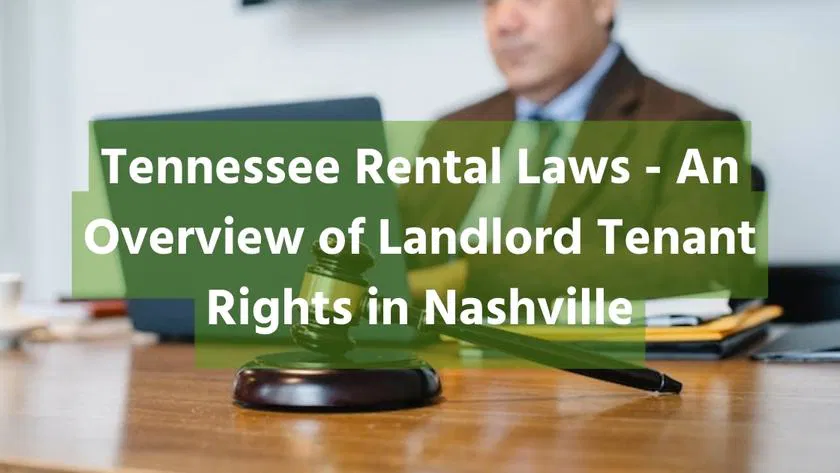RENEW has been in the Nashville property management world for over a decade. Through the years, we have become experts on the landlord-tenant laws in Tennessee. Rental property owners in Tennessee should be aware of the Tennessee landlord-tenant laws and regulations. Knowing landlord tenant laws can help you understand your rights as a landlord and allow you to deal with legal issues. The Tennessee landlord-tenant law protects the interest of both landlords and tenants throughout the tenancy.
It’s important to abide by these Tennessee landlord tenant laws and regulations to establish a healthy and respectful landlord-tenant relationship during the tenancy. Landlords and tenants have certain rights and under state statutes.
Rights and Responsibilities of Tenants in Tennessee
The following are the basic rights of Tennessee renters under landlord tenant act. Under landlord-tenant laws and regulations, a tenant in Tennessee has the legal right to:
- Live in habitable rental units.
- Take alternate action if the landlord does not provide a place that’s fit to live in.
- Make the necessary repairs to make the rental habitable according to Tennessee code and deduct the repair cost when paying rent.
- Be given a 24-hour notice in the final 30 days of the lease if the landlord wants to show the unit to potential renters.
- Legally pre-terminate a lease due to uninhabitable units, active military duty, landlord harassment, violation, or early termination clause in rent agreement.
- Not be evicted as a form of retaliation or discrimination.
- Be given a written notice and be evicted through the legal eviction processes.
The following are the basic Tennessee tenant responsibilities under landlord tenant laws and statutes. Under the tenant act, each Tennessee tenant must:
- Pay rent on time.
- Pay the required security deposit.
- Give the landlord notice if they choose to renew the lease.
- Comply and make the necessary or agreed repairs that they caused.
- Keep the rental free from damages and hazards.
- Abide by the Tennessee code of housing standards.
- Keep the property clean.
- Not engage in any illegal activity.
- Abide by any legal forms that were signed during the lease term.
- Take care of the unit and not intentionally damage or destroy any part of the dwelling unit.
- Avoid activities that may disturb other tenants and/or neighbors.
Landlord Rights in Tennessee
Under Tennessee landlord-tenant laws, the following are the basic landlord rights:
- The landlord has the right to collect rent when it is due or charge late fees.
- The landlord can charge a late fee as soon as the rent payment is 5 days late.
- The landlord has the right to demand payment for damages to the unit that are not part of normal wear and tear.
- The landlord has the right to begin the eviction process in case of any of the following:
- Tenant fails to pay rent even after the five-day grace period and 14-day Notice to Pay.
- Violation of lease terms.
- The tenant is still staying at the premises even after the lease agreement ends.
- Material health and safety violation.
- The tenant is engaging in illegal acts.
- The landlord has the right to deduct the following from the tenant's security deposit:
- Unpaid rent.
- Damages that are not part of normal wear and tear.
- Other reasons indicated in the rental agreement.
- If the landlord decides to increase the rent price, they can do so without providing notice.
The following are the basic landlord responsibilities in the state of Tennessee. The property owner must:
- Abide by the standards of habitability set by the Bureau of Health Administration.
- Provide the necessary or agreed services for the property.
- Follow the eviction process in accordance with Tennessee law.
- Return the security deposit to the tenant within 60 days after the lease agreement ends.
- Maintain the upkeep of the property by performing regular maintenance in a timely manner.
- Respond promptly to tenant requests for maintenance of essential services.
- Ensure the unit abides by all building and housing codes.
An Overview of the Landlord-Tenant Laws in Tennessee
1. Tenant Privacy and Landlord’s Right to Enter the Dwelling.
There is no mandate under Tennessee state laws that the landlord gives notice before entering inhabited properties. A landlord is only required to give a 24-hour notice in the final 30 days of the lease in case a potential new renter will want to view the unit.
Tennessee landlords and their tenants should agree on entry notice policies and these should be included in the lease. In addition, the tenant must provide landlord access in the case of an emergency, and the landlord is not required to provide notice.
2. The Condition and Maintenance.
The Tennessee landlord and tenant act does not have a traditional warranty of habitability requirements. Instead, the Bureau of Health Administration in Tennessee sets the minimum standards of habitability for landlords.
It's the landlord's responsibility to comply with these standards and make the necessary repairs within 14 days to keep the property in fit and habitable condition.
3. Tennessee’s Housing Discrimination Laws.
According to the Fair Housing Rules, it’s illegal to discriminate against prospective or actual purchasers based on disability, the source of income, gender identity, gender, sexual orientation, medical condition, familial status, age, ancestry, national origin, marital status, sex, religion, color or race.
Aside from what were stated in the federal Fair Housing Rules, the following behavior may be considered discriminatory in the state of Tennessee when directed at a member of a protected group:
- Refusing to rent out the property on a bona fide offer.
- Failing to provide reasonable accommodations.
- Encouraging or discouraging certain groups from applying on any marketing or advertising material.
- Being dishonest about the availability of the premises.
- Offering different terms, conditions, or privileges.
4. Security Deposits.
In Tennessee, there is no maximum limit on the amount landlords can charge as a security deposit. The tenant's security deposit may include an additional pet deposit, except from people with disabilities who use service animals.
A security deposit is defined as any advance payment from the tenant to the landlord. Landlords can deduct the following from the security deposit of their tenants:
- Missed payments.
- Cost of damage to the property found or not found during the inspection.
- Any other amount that the tenant owes the landlord.
5. Required Landlord Disclosures.
This should be in the form of writing, usually printed in the lease or rental agreement.
Tennessee landlords are required to make the following disclosures:
- Landlords who own homes built before 1978 must disclose information about lead paint concentrations.
- Landlords must provide the names, addresses, and contact information of the owner and any authorized agent or entity managing the property.
- Landlords must disclose the location of the account where the security deposit is held.
- Landlords must disclose in the lease agreement if he/she wishes to reserve the right to enter the property for viewing before the end of the lease term.
6. Renters Rights to Withhold Rent.
The Tennessee landlord tenant act states that if a landlord fails to take care of an important repair, tenants have several options. For example, they can:
- Exercise their right to make the needed repairs and deduct the cost from future rent payments.
- Legally break a lease due to uninhabitable units.
7. Small Claims Lawsuits.
Conflicts over security deposits are fairly common, and sometimes legal aid or the assistance of an attorney is required. Issues often arise against landlords who have failed to return the deposit after lease termination, or who unfairly withheld it from their renters.
Under the Tennessee landlord tenant law, tenants can sue landlords in the court of small claims for the return of their deposit and other rental and lease disputes, up to a dollar amount of $25,000.
Bottom Line
If you have specific questions about this law, hire the services of a qualified Tennessee attorney. Alternatively, you can contact a knowledgeable property management company in Nashville.
The experts at Renew Real Estate Services can help. We are familiar with all aspects of the landlord-tenant laws so you don’t have to worry about a thing.
Disclaimer: This blog should not be used as a substitute for legal advice from a licensed attorney in the state of Tennessee. Laws frequently change, and this post might not be updated at the time of your reading. Please contact us for any questions you have in regards to this content or any other aspect of your property management needs.


